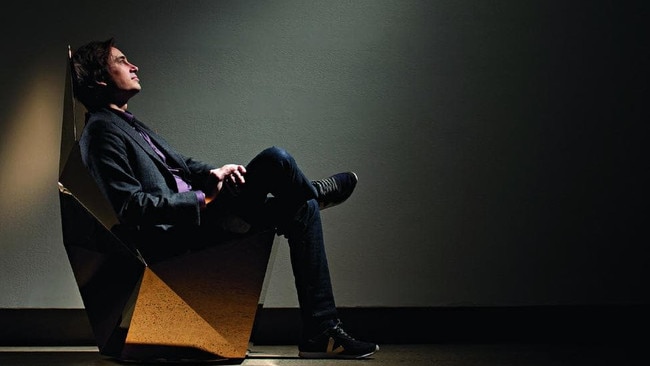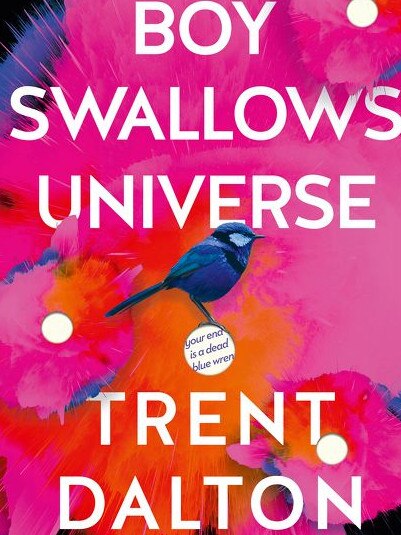Trent Dalton, Boy Swallows Universe: debt to John Irving
Trent Dalton’s debut is a catalogue of bad news, yet in thrall to the potential the world holds for lightness and love.

Read enough contemporary literature and you may come to feel that a fiat against joy is in force. Serious, intelligent novels can do irony, of course. They can laugh at the world, as long as this is done through the prism of the intellect.
More overwhelming states of mind — bliss, terror and, yes, joy — are left to more sincere art forms such as dance, music, poetry, or to the generic ghetto of film, or even to religion and other apparently obsolete manifestations of human feeling.
This is part of our long modernist hangover, in which true, unillusioned knowledge of the world is necessarily bitter and tainted.
Joy, by contrast, has a Dickensian flavour. It is an expression of high Victorian sentimentality in which the emotional taps of the novel are turned on and left to overflow.
This is why it is such a pleasant shock to encounter a new Australian novel in which joy is shamelessly deployed.
Trent Dalton’s debut, Boy Swallows Universe, is not a happy book. It is a catalogue of bad news in which criminality, greed, addiction, violence and family breakdown are investigated with unflinching attention to every gory, banal and sinister detail.
Yet the background radiation of the narrative is purely joyful. It is a story in thrall to the potential the world holds for lightness, laughter, beauty, forgiveness, redemption, and love.
As the great neo-Dickensian novelist (and that rare other who can make joy swing on the page) John Irving once wrote: ‘‘It is hard work and great art to make life not so serious.’’
In outline, though, Dalton’s novel sounds manifestly unpromising. It is 1984 in the southwestern suburbs of Brisbane: a time and place of modest ambitions and narrow horizons, where the Parramatta Eels rugby league team is unassailable and a Betamax video player is a device to kneel before.
We see this world through the eyes of a pre-teen boy, Eli Bell. He’s both a quintessential Australian 10-year-old and a desperate outlier in terms of life situation. Eli does not know his father, a drunk who split with Eli’s mother long ago. Instead, he lives with his mother, Frances, and stepfather, Lyle, a man who cannot tell a lie but nonetheless makes his living as a mid-tier heroin dealer.
Eli’s minder when his parents are at ‘‘work’’ is an ex-con named Slim, an old man now but in his prime a notorious inmate of Boggo Road jail.
The cherry on top of this dysfunctional domestic sundae is August, Eli’s older brother. August is a savant of sorts who decided early on that speech was not his thing. True to his word, he hasn’t uttered one for years.
There is something winning about Eli, despite his miserable circumstances. He’s smart and determined. He is capable of deep love for the flawed adults around him: his beautiful and often wasted mother, his criminal stepdad, his chain-smoking babysitter and Slim, the ‘‘Houdini of Boggo Road’’.
Most of all, he loves August, the older brother who has cared for him throughout all the shifts and backtracks of their family life so far, a kid who writes Zen koans of his own mysterious divining with a single finger in the suburban air.
Dalton, a feature writer on this newspaper, invests this unlikely cast and milieu with considerable energy, wit and charm. He delights in the play of language and imagination that a child can summon: the sense in which the clear moral eye of youth can critique and adore simultaneously without judgment or adult moral finessing. But he frames this as a demographic tragedy of sorts, too. Take this insight, granted to ‘‘Back off’’ Bich Dang, Vietnamese drug queenpin, for whom Lyle effectively works:
Truth is, Bich said, Australian childhoods are so idyllic and joyous, so filled with beach visits and backyard games of cricket, that Australian adulthoods can’t possibly meet our childhood expectations. Our perfect early lives in this vast island paradise doom us to melancholy because we know, in the hard honest bones beneath our dubious bronze skin, that we will never again be happier than we were once before.
‘‘She said,’’ the lesson concludes, ‘‘we live in the greatest country on earth but we’re actually miserable deep down inside and the junk cures the misery and the junk industry will never die because Australian misery will never die.’’

Certainly, misery resides in these pages. Dalton tells a story in which Lyle, caught doing some entrepreneurial work on the side, is disappeared by some sinister higher-ups in the Brisbane drug trade. Frances goes to jail rather than flesh out this situation to the police, and Eli and August are obliged to return to the home of their long-estranged father. Once there, they try to inhabit the youthful idyll the nation is meant to have in store.
Dalton’s vision can be melancholy and antic within the space of a sentence. Sentiment is checked by mordant humour, and moralising by a celebration of that resolutely local phenomenon: the convict/bushranger/bikie who acts out of moral outrage at the existing order rather than from some inborn violence.
Whether this idea of an antipodean berserk is anything more than a projection of our desire to see ourselves as strong and undiminished in frontier vigour is not a question the novel asks.
Instead, it wonders at an alternative: to what extent does our gravity as moral agents reside in the stories we tell ourselves? To what extent are kindness or decency structures of feeling we have to jerry-rig before being able to climb inside? Boy Swallows Universe suggests that men are obliged to cobble selfhood and agency together, building better selves from fragments of older men — partial, intermittent, flawed as those models may be.
The novel is at its own best when a degree of wickedness creeps in. We don’t want — and don’t trust — young characters of promise who have no propensity to screw up, overthink, project and misunderstand an opaque adult world. Eli Bell can strike the reader as obtuse in a particular way. His determination exceeds his capacity to enact that determination, he is awake to the potential of human badness, but is a naif when it comes to fighting back. Humour is his only shield:
My father rests an elbow unsteadily on a square white coffee table scratched in parts to reveal historical layers of multi-coloured paint coatings, like the inside of a jawbreaker lolly. Beside his bare right foot is a yellow plastic cup like the ones I used to glug cordial from in primary school. Next to the cup is a silver wine cask bladder wrung to death like an old chamois.
It’s worth stopping to admire such sentences. The faded, Polaroid realism of things, the way Dalton accelerates the final sentence so the eye pulls up hard on an image for all the small sad failures of dignity that can mark a life.
Boy Swallows Universe consists of a reasonable stretch of the Bell family’s story. Years pass in epical, perhaps foreordained ways, terrible things happen, though a maturation in years for Eli grants an expansion of narrative sensibility and scope that shifts to a less determinedly comic but more satisfying story.
Readers of Irving will see Dalton’s debt to him, right down to Eli’s loss of a finger under a drug dealer’s knife, an echo of Owen Meany in the Irving novel named after him. But they will forgive him because the world he constructs is so different, so exacting in its stocking of the cupboards of period detail. This is a world in which families gather around butcher’s paper filled with seafood sticks and Chiko Rolls.
It is a curious feeling to see your generation’s childhood turning sepia, into historical record, into myth. But it is the necessary mark of middle age to become a tourist rather than a local participant in the cultural imagination.
Instead, we watch others enter life for the first time: crazy brave, unbowed and wholly unaware of what is in store for them. What Dalton has done in these pages is accelerate that maturation process, so that Eli escapes the adult necessity of compromise for the sake of stability and security and can speak with an unalloyed moral certitude, as well as a droll teen nihilism.
He and August are the distant, secular offspring of those child preachers of the 19th century: prodigies of Bible knowledge and language whose prowess at the pulpit is held as evidence of divine election at work.
They can walk through the wounded, damaged, shell-shocked world of their parents without getting a scratch, because they haven’t yet heard what Bertolt Brecht used to call ‘‘the terrible news’’ about the world.
That their innocence should be such an unsuspectedly joyous experience for readers to encounter says as much about our present moment as it does about Dalton’s sad, warm, witty world.
Geordie Williamson is The Australian’s chief literary critic.
Trent Dalton will discuss his book at a series of author events in coming weeks. Details: www.harpercollins.com.au
Hear Trent Dalton speak about his novel at a subscriber-only Q&A. Sydney, July 24; Brisbane, July 25. Book online at theaustralianplus.com.au
Boy Swallows Universe
By Trent Dalton
Fourth Estate, 480pp, $32.99




To join the conversation, please log in. Don't have an account? Register
Join the conversation, you are commenting as Logout